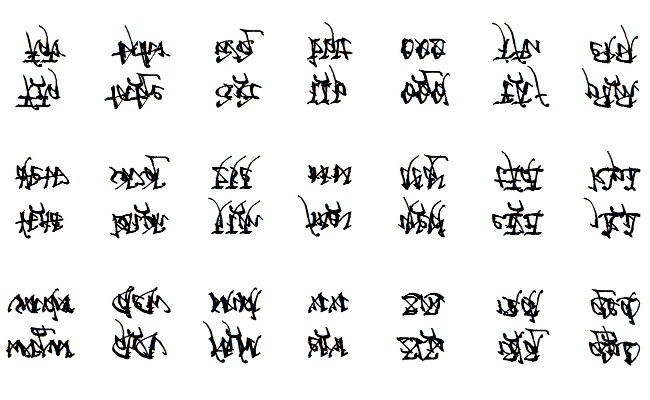Hadji was a grey beard. On Route Mambo there were only grey beards and ninjas and seven-year-old punks. So far as we could tell, the grey beards had no jobs and no purpose in life except to smoke cigarettes and complain. Several of them would meet at the chai stand near the highway, a few dirty red and white plastic tables and chairs under a canopy of palm fronds, where they would drink tea, play checkers, and bitch without cessation from the morning's first prayer until curfew. They bitched about the governent—"those mobsters"—and they bitched about the American occupation, and they bitched about the heat. We bitched about the heat too. That much we had in common.
Hadji kept to himself. He lived in a one-room adobe house that he shared with a dying heifer. Part of his ceiling, a few sheets of overlapping corrugated tin, remained open to the sky. Every day I made a point of stopping in to ask Hadji if he had any information he wished to share.
"You are bastards," he said. My interpreter, Barzan, a magnificently mustachioed Kurd who loathed talking to the grey beards almost as much as we did, rolled his eyes.
"That is not new information," I replied.
We had our ritual. Every morning, Hadji pushed his empty cart up the road, and when he came back before sundown, the cart was empty again. He said that he went to market.
Each day I would be like, "You go to market with nothing. You come home with nothing. How is that not suspicous?"
Sometimes, he produced from the pockets of his dishdasha small tokens of his bartering, relics and artifacts. A withered Persian cucumber. A magazine ad for a Rolex watch. A pack of Gauloises cigarettes.
"You go to the souq every day?"
"Yes."
"And this is all you bring back?"
"Yes, Captain." He could be a polite asshole. Or artless. It was hard to tell which. Bowing and nodding and wringing his hands, he made himself smaller and smaller.
"Either you are lying," I said, "or you are the world's worst haggler." He laughed every time I said this, and then I would say, "You know what I think?"
"Yes," he said.
"I think you're working for them. I think you're passing information." Then I leaned in, real close, like I was taking him into my confidence. "Prove me wrong."
Hadji never did.
If he had been working for the insurgents, then he was such low-hanging fruit that we figured it wasn't worth our time to snatch him up and turn him over to the MPs and intel analysts for interrogation. The only suspicion I harbored was that we wasted a lot of time questioning the village idiot.
Then again, if your whole mission is a waste of time, why not talk to the village idiot?
Of course, that wasn't his real name, Hadji. For what seemed like forever, I tried to get my men to stop calling him that. It was disrespectful, a slur, something we were briefed not to do. The men tried, they really did, but the name stuck. Over time I let it go. I cut the men some slack because, after all, you've got to know how to pick your battles.
To read the rest of this piece, purchase issue 27.1 here.

